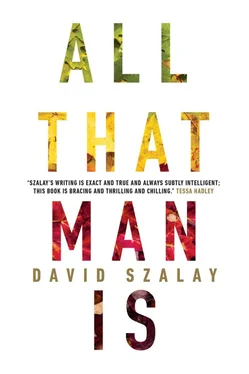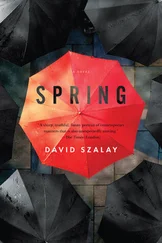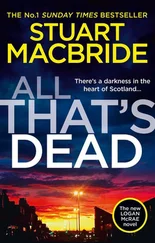That Hans-Pieter has something else to do is a surprise. The underlying premise of their friendship is that neither of them ever has anything else to do. No one else to see. There is no one else. That’s why they are friends. Take that away, and it’s not obvious what would be left.
Actually, it’s not quite true that there is no one else. There’s Damjan. An acquaintance of Hans-Pieter, a native. Damjan has a job though — he works at a tyre-fitting shop next to the train tracks. He has a family. He has, in other words, what passes for an ordinary life.
Murray meets him later in the bar of the Umorni Putnik.
Murray is disappointed, arriving there, that Maria isn’t around. Inasmuch as Murray has a purpose in his life now, that purpose involves Maria, who serves drinks in the youth hostel. She is not, he feels, out of his league. For one thing, she is not very attractive. She is young and friendly, and her English is excellent — she even understands Murray when he speaks. He has had his eye on her for some time, since last winter. All year he has been planning to make his move.
He was particularly hoping to find her there this evening. He feels down. Outside, it is already dark. The evenings are shortening now. The nights, as they say, are drawing in.
He sees Damjan arrive.
‘Damjan, mate,’ Murray says, standing eagerly to shake the tyre-fitter’s hand.
Damjan is short, muscular, untalkative — the sort of man that Murray instinctively defers to.
Damjan, while still shaking Murray’s hand, looks around. ‘Hans-Pieter?’ he asks.
‘Not here,’ Murray tells him. ‘I dunno where the fuck he is. Lemme get you a drink.’
‘So,’ Murray says, when they are sitting down. ‘What you been up to then?’
‘What you been up to?’ Murray asks again when Damjan says nothing. ‘What you been doing?’
Damjan, perhaps still not understanding, shrugs, shakes his head.
‘You’re okay, though?’ Murray asks.
‘Okay, yes.’
This is in fact the first time they have had a drink together without Hans-Pieter being there. It turns out to be surprisingly hard work.
They end up talking about tyres.
‘So what about Pirelli?’ Murray finds himself asking. ‘How do they compare? With Firestone, say.’
Increasingly, there are long silences, during which they separately survey the room, trying to find a woman worth looking at.
Then Murray asks another question about tyres, which Damjan dutifully answers.
They have been talking about tyres for almost an hour.
‘I had Mitchell-in on the Merc,’ Murray says, after a long pause. ‘Top quality.’
Damjan just nods, drinks.
‘D’you think we’re going to see Hans-Pieter tonight?’ Murray asks.
Damjan shrugs.
‘You don’t know where he is?’
Damjan, lifting his drink, shakes his head.
Which, it turns out later, is a sort of lie. He knows more or less where Hans-Pieter is. Hans-Pieter is at Maria’s flat, naked, watching an episode of Game of Thrones dubbed into Croatian on Maria’s squat little TV.
In the morning, autumn has arrived. The temperature has fallen twenty degrees overnight. Surveying it from his window, in pants and vest, Murray is triumphant. He looks forward to shoving this turbulent autumn day, full of wet leaves, in Hans-Pieter’s face and saying, ‘So what about this then? You fancy an ice cream now, ya fucking parasite?’ He starts to smile, until an eruption of coughing knobbles him and he turns from the window trying to force out the word Fuck as he doubles over and the veins in his temples swell and throb.
‘FUCK!’
‘Fuck.’
Silence settles on the flat, like dust. He found it, the flat, with Hans-Pieter’s help, about a month after arriving in the town. His landlord is a middle-aged man whose mother lived here until she died, and most of her stuff is still in place — vast dark wooden furniture looms in the two rooms. Down at floor level Murray lurks among the old lady’s pictures and knick-knacks, her pedal-operated sewing machine, her damp bedding. He had wanted it fully furnished. He uses her old steel knives and forks, her stained plates. There are even, on the walls, some framed photos of people in old-fashioned clothes, strangers with grave sepia faces.
The flat is still full of warm, stale air. The flapping grey scene outside its two grand windows seems disconnected from the tepid silence of the interior. It seems weird, histrionic. Rain comes at the windowpanes like handfuls of pebbles. Murray lights a cigarette. He smokes a local brand now — to that extent he has gone native. He sits in the hot shaft of the bathroom, surrounded by rust-furred piping, discoloured tile-work, a light bulb burning high overhead.
Afterwards, he dresses, and wrestles an umbrella the short distance to the Umorni Putnik.
Hans-Pieter is there, having breakfast at a table in the shadowy bar. A coffee, a buttered bread roll. He seems to be staring at a point about two feet in front of his eyes. Fucking space cadet , Murray thinks.
Without acknowledging his friend, he addresses himself to the bar, where Ester is on duty. Ester — she is out of his league.
She’s pals with Maria, though, so it’s probably worth keeping in with her: Murray smiles.
He feels the insufficiency of that smile himself, sees its insufficiency for a moment in the deep murky shadows of the mirror behind her. (The price list is written directly onto the mirror — his face peers out from among the numbers.)
‘Yes?’ Ester says.
‘Cappuccino,’ Murray’s face says, in English.
While she works the machine, he looks at a local newspaper. The words mean nothing to him, his eyes drop from picture to picture. Pictures of local politicians — mean-looking men with terrible haircuts trying to smile, as he has just tried to, and with, for the most part, a similar lack of plausibility.
When he has his cappuccino, he joins Hans-Pieter. ‘Morning,’ Murray says, mutters, taking a seat opposite his friend.
Hans-Pieter, his mouth full, just nods.
He seems to be force-feeding himself a bread roll.
Murray regards him with distaste for a few moments. ‘Where were you last night then?’ he asks finally.
Hans-Pieter is swallowing the bread in his mouth. He tries to speak prematurely and the words are indistinct.
Murray squints at him irritably. ‘What was that?’
‘Ammarias,’ Hans-Pieter says, swallowing.
‘What?’
Hans-Pieter swallows properly. ‘Maria’s. At Maria’s flat.’
‘What d’you mean?’
Hans-Pieter is unable to hold Murray’s stare. ‘You know — Maria?’
‘Maria,’ Murray says, struggling, it seems, to understand who they are talking about, ‘who works here ?’
‘Yes.’
You were at her flat ?’
‘Yes.’
‘Why?’ Murray asks, sincerely puzzled.
‘Well.’ Hans-Pieter laughs shyly. ‘You know…’
‘No, I don’t know.’
‘We’ve…We’ve got something going,’ Hans-Pieter says.
Murray, for a moment, looks totally nonplussed. ‘What — you ?’
Hans-Pieter nods.
‘You and Maria?’
Hans-Pieter looks down. ‘Well, yes,’ he admits. He seems embarrassed. And it might be that he misunderstands Murray’s perspective. Maria is twenty years younger than Hans-Pieter, more or less. She is overweight and unattractive. Things that are, potentially, sources of embarrassment.
‘How did that happen?’ Murray says. He has turned quite pale.
Last Friday night, Hans-Pieter tells him, he was there in the Umorni Putnik until it shut, as he usually is, and it was pissing down outside, and she didn’t have an umbrella — she was waiting for it to stop, so he suggested she come up to his room and wait there, have a smoke, and she did, and they ended up spending the night together. Since then, he tells Murray, he has twice spent the night at her flat.
Читать дальше












